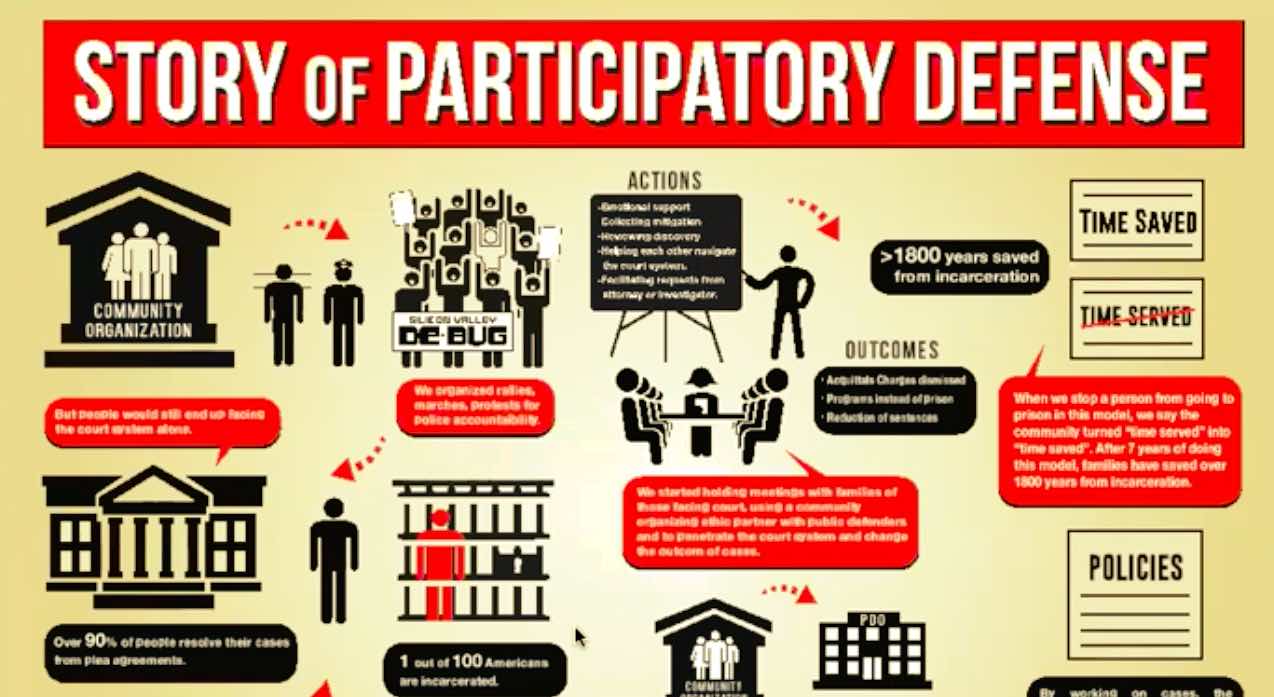Overview
Families and communities most impacted by mass incarceration in the United States can effectively participate in the criminal defense process and transform the landscape of power in the court system.
It starts with a fundamentally new relationship between public defenders and their client communities. It gives citizens facing charges a stake in their justice system and provide pathways for them to make it work better. Ordinary citizens become the changemakers that shift case outcomes and then transform the agents and institutions of the courts themselves.
It starts with a fundamentally new relationship between public defenders and their client communities. It gives citizens facing charges a stake in their justice system and provide pathways for them to make it work better. Ordinary citizens become the changemakers that shift case outcomes and then transform the agents and institutions of the courts themselves.
Details
Coalesce into a movement those facing incarceration, their families and communities, and the attorneys who represent them. Families and friends of those accused of a crime become extensions of the legal defense team – scouring police reports, discussing defense strategy, creating mitigation material (including creative new tools like social biography videos), and maintaining a presence in the courtroom.
One of the more creative and effective tools is social biography videos which focus on a defendant’s humanity and highlight the extensive support community he or she can rely on to get back on the right path.
This family and community engagement in cases takes the form of an extended legal defense team. Families meet weekly, supporting one another as they navigate the maze of the adjudication process, and strategizing around the spaces where they can influence its path. It could, for example, be the family securing investigatory material early in a case, offering defense strategy for a trial, giving day-by-day jury observations to trial lawyers, or submitting mitigation packets for a sentencing. It might be recruiting expert witnesses for the defense.
The collaborative (as opposed to adversarial) frame of participatory defense is especially appealing to chief defenders, who are beginning to see how additional manpower can help them do their jobs better.
The results should be a larger, more inclusive discussion around incarceration in America that has people who have looked under the hood of its mechanics at the center.
Raj Jayadev founded the A.C. Justice Project to give citizens facing charges a stake in their justice system and provide pathways for them to make it work better.
https://www.ashoka.org/en/fellow/raj-jayadev
One of the more creative and effective tools is social biography videos which focus on a defendant’s humanity and highlight the extensive support community he or she can rely on to get back on the right path.
This family and community engagement in cases takes the form of an extended legal defense team. Families meet weekly, supporting one another as they navigate the maze of the adjudication process, and strategizing around the spaces where they can influence its path. It could, for example, be the family securing investigatory material early in a case, offering defense strategy for a trial, giving day-by-day jury observations to trial lawyers, or submitting mitigation packets for a sentencing. It might be recruiting expert witnesses for the defense.
The collaborative (as opposed to adversarial) frame of participatory defense is especially appealing to chief defenders, who are beginning to see how additional manpower can help them do their jobs better.
The results should be a larger, more inclusive discussion around incarceration in America that has people who have looked under the hood of its mechanics at the center.
Raj Jayadev founded the A.C. Justice Project to give citizens facing charges a stake in their justice system and provide pathways for them to make it work better.
https://www.ashoka.org/en/fellow/raj-jayadev
Origin of the idea
{project-source}Proposal Type & Period
Type: Improve an Institution.Period: {project-length}.
Resources



